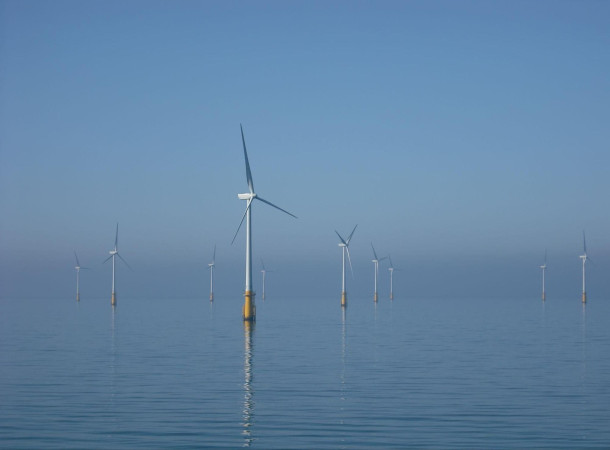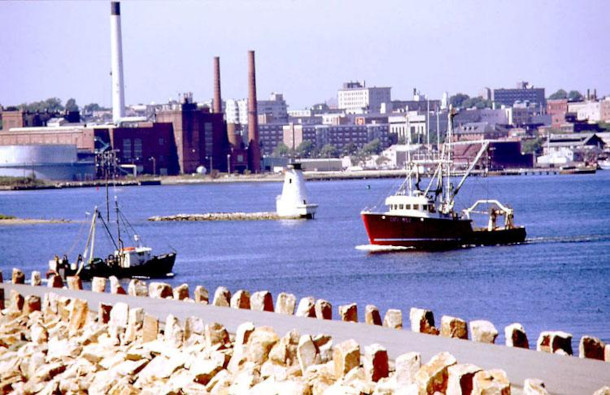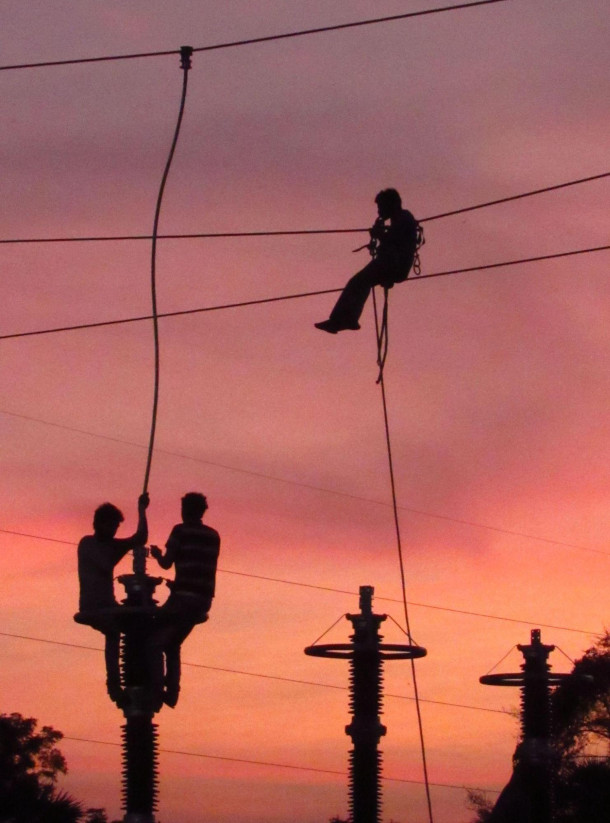Trump Stalls Offshore Wind
Air Date: Week of September 12, 2025

The Trump Administration issued a stop-work order for an offshore wind farm in development off the coast of New England, Revolution Wind. The final product, like this one in Europe, would have provided clean energy for thousands of homes. (Photo: Andy Dingley, Wikimedia Commons, CC BY-SA 3.0)
The Trump Administration is putting offshore wind energy on hold by canceling grants, cutting tax credits and revoking permits for projects that are nearly complete. David Cash, the former Region One Administrator of the Environmental Protection Agency under President Biden, joins Host Jenni Doering to discuss the economic impacts to port communities and his view that the US is ceding the opportunity to be a global leader in renewable energy.
Transcript
CURWOOD: From PRX and the Jennifer and Ted Stanley Studios at the University of Massachusetts Boston, this is Living on Earth. I’m Steve Curwood.
DOERING: And I’m Jenni Doering.
The American Clean Power Association says there is enough offshore wind capacity in the works nationwide to affordably power 22 million homes. But the Trump Administration is putting this abundant renewable energy source on hold by canceling grants, cutting tax credits and revoking permits. And just this August, the administration issued a stop-work order against a wind farm off the coast of New England that was already 80% complete. Here to talk to us about the impact of these actions is David Cash, the former Region One administrator of the Environmental Protection Agency under President Biden. So David, wind power was supposed to help us meet the challenge of the climate emergency, but the White House seems to be saying no, huh?
CASH: Yeah, well, in the last several weeks, there have been a lot of announcements by the administration, not just about particular projects, but a whole range of actions that it's taking to stop the wind industry, just as it's taking off. And maybe what you're referring to is the stop-work order for Revolution Wind. That's a large wind farm off the coast of Rhode Island and Connecticut. Already, private sector has invested over $4 billion in the construction of that farm. But the stop-work order is only one of many. In a cabinet meeting, the President instructed all of his agencies to look at the various tools that they have to stop wind as well. For example, Health and Human Services Secretary Kennedy says he will explore the electromagnetic fields from wind turbines, which have scientifically been shown not to be significant. The Department of Defense Secretary is looking at national security issues, and again, those issues have been exhaustively studied. Each of these projects that are targeted, Revolution Wind, for example, has been nine years, nine years of permitting, working with federal agencies to determine what kinds of problems might exist and if there are any problems, how to mitigate them. Another action that was taken was cancelation of all federal funds that are going to offshore wind related activities. So the Department of Transportation canceled over $600 million of grants that were going to rebuild ports, and all up and down the East Coast, there are ports that have come on hard economic times, and were looking to offshore wind as the new industry to boost their economy.
DOERING: Yeah. I mean, not far from me in Salem, Massachusetts, one of those ports has been affected by this decision.

One of the projects threatened by the Trump Administration aimed to revitalize New Bedford, Massachusetts, a town once built on the whaling industry. (Photo: Kevin Saff, Wikimedia Commons, public domain)
CASH: That's exactly right. I believe that was a $34 million grant where new industries, it was going to attract manufacturing, going to attract service industries, all of the kinds of things that this administration claims that it wants to grow, on shore, domestic manufacturing and commercial industries. And the cessation of these kind of grants is going to have a huge impact.
DOERING: You know, when you were Region One Administrator of the EPA in New England, what did you learn from locals about the promise of wind energy they saw?
CASH: There was a lot of excitement about the possibility of wind energy and what it could bring to their communities. I remember once going to New Bedford, where there was a celebration of all the graduates from a workforce development program that was sponsored by the Environmental Protection Agency. And I met a fellow there who had been in the fishing industry, he had left the fishing industry, was looking for his next way to grow economically. And he found this workshop opportunity where he could be trained as a steel worker and someone who would go out and climb those tall poles where the turbines are and maintain them, and it's a really hard job, and it's a very demanding job, and he loves it. And I just can't imagine what he's going through right now as he's seeing the project that he's working on is a target of the Trump administration. I just don't know what he's talking about at his dinner table right now. It's got to be a tough conversation.
DOERING: And in the case of New Bedford, which offshore wind project was being staged there, and has that been affected by the Trump administration?

President Trump says he wants to increase American energy production. Despite this, he is opposed to offshore wind development. (Photo: Gage Skidmore, Wikimedia Commons, CC BY-SA 3.0)
CASH: Yeah, so there were a number that are out south of Martha's Vineyard. They're in various states of concern about permits being revoked, perhaps stop-orders for them as well. So there's definitely going to be impacts in New Bedford, no question. I think this is a gut punch to the port cities and towns who have been thoughtfully and strategically planning for the growth of an industry that they see can be the next big boost for them. You know, you take a city like New Bedford, and there's something delightfully poetic about New Bedford, because New Bedford, a port town for 250, 300 years, it grew up on whaling. And whaling, you know, it was an industry in the mid 1800s that brought whale oil to ports that then could be distributed for lighting. It was a source of energy. And New Bedford was one of the biggest lighting ports, energy ports, whale oil ports. And of course, as whaling slowed down, that led to economic hardship within New Bedford. And here comes wind on the horizon, offshore wind, that will make New Bedford again a source of light, a source of, this time, electricity that will power the lights in people's homes all over New England. And New Bedford through a very concerted and again strategic effort, through its economic development office, through community groups, through the state's economic development office, through the local community colleges, I mean, the effort was a comprehensive effort that also saw the huge advantage of lifting up members of the community who were struggling economically. And New Bedford has a relatively high unemployment rate compared to other places in New England. And here was a great opportunity to retrain a workforce, and this is the city where I met that former fisherman turned steel worker. And just multiply New Bedford, I don't know, dozen, couple of dozen times, all up and down the East Coast, and all of them are left scratching their heads, why this is happening, as they struggle now to put food on the table. That's one of the many huge negative impacts of this kind of decision-making.
DOERING: David, what are the legal implications of revoking these permits at this stage?

Towns along the New England coast invested in retraining workers to maintain the offshore wind power systems. Now, many of those jobs are at risk. (Photo: Sindugab, Wikimedia Commons, CC BY-SA 4.0)
CASH: Yeah, so there's been several litigation efforts that have been made right after the stop-work order for Revolution Wind. Orsted, the European company that's driving this, although it's in partnership with American companies as well, and the states of Connecticut and Rhode Island file suit to stop that. And in the spring, in May, I believe 17 attorneys general had filed a lawsuit against the Trump administration for its one of its first executive orders that also put a target on the back of wind. And so those are cases that are moving forward, it's not totally clear what's going to happen, whether or not the Trump administration can legally reverse some of these permits, is going to be a really interesting question. And I know that there's real concerns about potential violations of the Administrative Procedures Act. You know, this is an act that requires the government to make these kinds of decisions, not in an arbitrary and capricious way. And the argument of these state attorneys general is that the Trump administration has been making these decisions in an arbitrary and capricious way. And so we'll see how that unfolds.
DOERING: Right, like so many things that the Trump administration has been doing, this ends up in the courts, and we'll have to see, I guess, what judges and appellate courts decide ultimately. And maybe even the Supreme Court.
CASH: It might go all the way to the Supreme Court. That's exactly right.
DOERING: So zooming out, what do you think are the bigger legal and economic implications of the federal government revoking these permits, not only to the wind industry itself, but commerce at large?
CASH: I think that the revocation of these permits sends a very, very troubling signal to the private sector, because it says government can change its mind and can be very unpredictable. And that's not what business needs. Business needs certainty. And it needs certainty because business needs investment. And so it goes to an investor and say, hey, I want you to invest in my project here, my projected returns on that investment are so much that you should invest. And if that investor is saying, but wait a minute, you might be 80% done with your project, and the government can stop you. I don't think I'm going to invest in you. That's the real economic concern.

David Cash is the former Administrator of EPA's Region 1, New England. (Photo: Courtesy of David Cash)
DOERING: I think there's been a lot of sense that despite the Trump administration trying to walk back renewable energy, people are reading the tea leaves, you know, a lot of businesses in the United States and around the world think that renewable energy, wind power, solar power, really is the future. To what extent do you think the Trump administration is going to hold back these industries in a way that lasts?
CASH: So let me pose a question to your audience right now. Of new energy projects that began in the last year, let's say in 2024, what percentage of those were renewable energy?
DOERING: You know, I don't, I don't know the answer, David.
CASH: Well over 90%.
DOERING: Wow.
CASH: So renewable energy is not only the future, it's the present, right now. And so, long, long term, we will move into the renewable energy future. But because of what we know about what the science tells us about the climate crisis, we can't afford to wait. But also it's this economic question where we're ceding the opportunity to be global leaders in renewable energy development, deployment and job growth. And we're essentially saying, nah, we don't want to do that. China, you can do that. And India, you can do that. Europe, you can do that. Brazil, you can do that. We're not going to participate in that. And I can't think of another kind of period in history where the writing was on the wall for some kind of new, incredible technology. And a government would say, you know what, we don't want to play in that game. Governments want to play in those because they see huge economic opportunity, and here we're essentially saying we're not going to deal with this now. We'll let other countries take the lead.
DOERING: David Cash is former Administrator of the Environmental Protection Agency Region One, New England. Thank you so much, David.
CASH: Thank you. Jenni.
Links
The New York Time "Donald Trump vs. the Wind Power Industry"
Learn more about President Trump’s claims regarding wind power
Explore Revolution Wind’s website
CNBC "Offshore wind has no future in the US under Trump administration, Interior Secretary says"
Living on Earth wants to hear from you!
Living on Earth
62 Calef Highway, Suite 212
Lee, NH 03861
Telephone: 617-287-4121
E-mail: comments@loe.org
Newsletter [Click here]
Donate to Living on Earth!
Living on Earth is an independent media program and relies entirely on contributions from listeners and institutions supporting public service. Please donate now to preserve an independent environmental voice.
NewsletterLiving on Earth offers a weekly delivery of the show's rundown to your mailbox. Sign up for our newsletter today!
 Sailors For The Sea: Be the change you want to sea.
Sailors For The Sea: Be the change you want to sea.
 The Grantham Foundation for the Protection of the Environment: Committed to protecting and improving the health of the global environment.
The Grantham Foundation for the Protection of the Environment: Committed to protecting and improving the health of the global environment.
 Contribute to Living on Earth and receive, as our gift to you, an archival print of one of Mark Seth Lender's extraordinary wildlife photographs. Follow the link to see Mark's current collection of photographs.
Contribute to Living on Earth and receive, as our gift to you, an archival print of one of Mark Seth Lender's extraordinary wildlife photographs. Follow the link to see Mark's current collection of photographs.
 Buy a signed copy of Mark Seth Lender's book Smeagull the Seagull & support Living on Earth
Buy a signed copy of Mark Seth Lender's book Smeagull the Seagull & support Living on Earth

